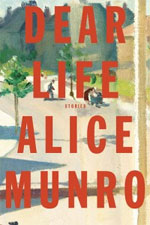
Dear Life, like every new Alice Munro collection, is like returning for what will be a wonderful visit with a cherished, wise and quietly wicked good friend. Does it feel that way even if you are discovering Munro for the first time? I suspect it does, although for this reader, that firsthand feeling is now many books ago. This renewed visit with Munro is possibly my most cherished of all.
For good reason, it’s rare when an Alice Munro book gets something resembling an indifferent, much less a bad review. One smartypants sentence perhaps doesn’t count as a review of any ilk, but yes, trains and train schedules do appear a lot in this collection, and they literally and symbolically link the stories. Much of Dear Life is about arrivals and departures of all kinds and, with gentle perversity that characters often stoically withstand, how life’s moments and milestones don’t always materialize to an expected schedule.
Once again, with crisp but not heartless precision, Munro cultivates a rich undercurrent beneath every seemingly benign exterior. Sometimes, that undercurrent is more perceptible to the reader than the protagonist. However, that doesn’t make us love or admire any less the oblivious but resilient bride-to-be or the cheerfully determined woman who doesn’t know she’s succumbing to Alzheimer’s but acknowledges that others might be fighting it and should be accommodated accordingly and compassionately.
“She likes how the lattice provides a touch of fantasy. Public buildings have been changing in the past few years, just as private houses have. The relentless, charmless look – the only one permitted in her youth – has disappeared. Here she parks in front of a bright dome that has a look of welcome, of cheerful excess. Some people would find it fakey, she supposes, but isn’t it the very thing you would want? All that glass must cheer the spirits of the old people, or even, perhaps, of some people not so old but just off kilter.”
Leave it to Munro to save the most powerful impact for almost the last page. Whether you were convinced already or not, the eponymous story “Dear Life” (part of a “finale” sequence that Munro suggests is autobiographical) proves that those very words form not a placid, sentimental phrase, but are fused into something utterly urgent, even harsh, often hard won, always vital. Based on what might have been a misunderstanding, filtered and interpreted through the fog of years, mutual unstated grievances, tenuous memories, Munro believes that her mother once rescued her from strange but real danger:
“Perhaps that daughter, grown and distant, was the one she was looking for in the baby carriage. Just after my mother had grabbed me up, as she said, for dear life.”
Again, Munro’s deceptive economy of expression leaves a potent, moving, unforgettable impression. Let’s hope it’s not her last, but treasure it if it is.
See also:
- Recalling Lives Altered, in Ways Vivid and Untidy
(The New York Times) - Dear Life by Alice Munro – review
Lauded Canadian short-story writer Alice Munro gives tantalising glimpses of her own life in this fine collection
(The Guardian / The Observer) - Alice Munro, The Art of Fiction No. 137
Interviewed by Jeanne McCulloch, Mona Simpson
(The Paris Review)
